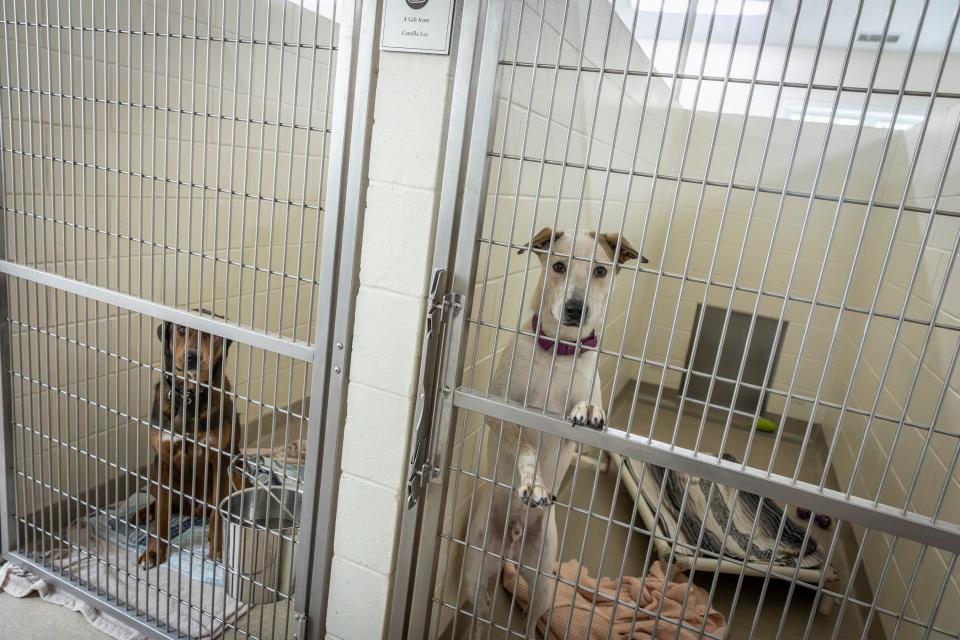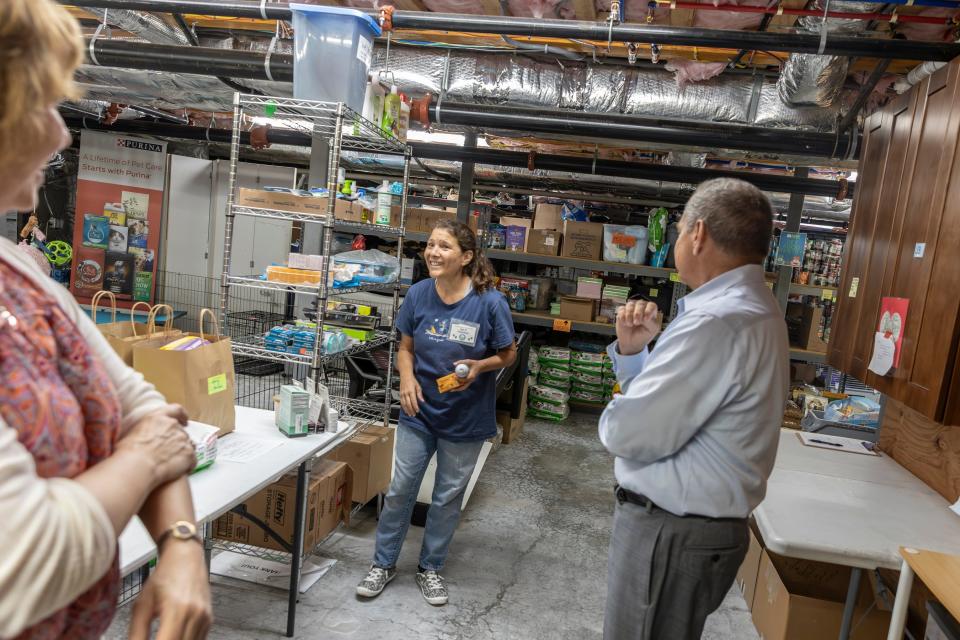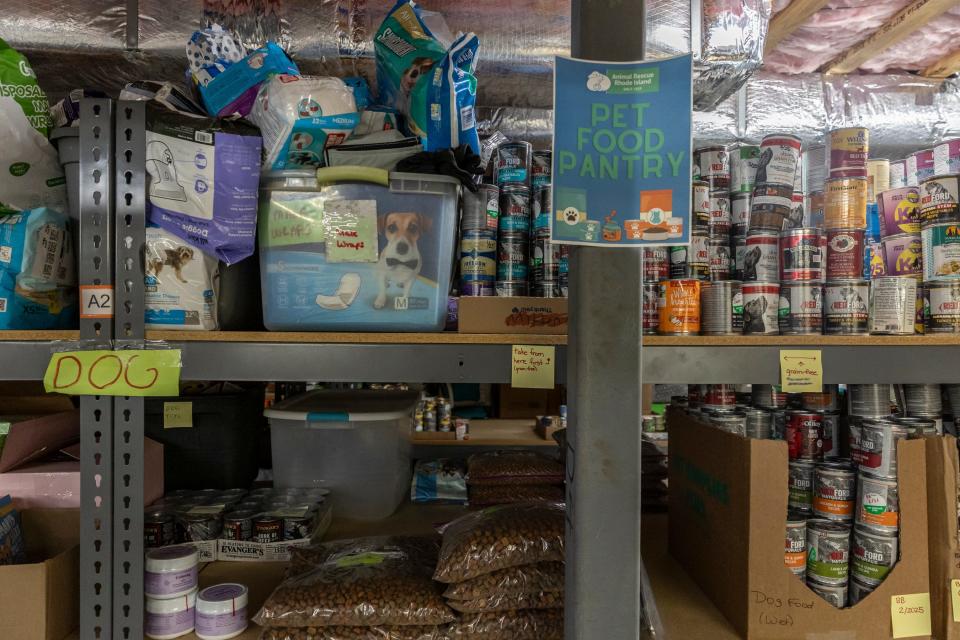The RI Foundation is giving $530K in grants to help animals. Here's how it will be spent.
Pets suffer, too, when their owners fall on tough financial times, often missing important veterinary care such as vaccinations and annual examinations.
To help address that problem, the Rhode Island Foundation on Tuesday morning is awarding $530,000 in grants to more than two dozen local animal-welfare agencies, with much of the money helping to provide veterinary services for dogs, cats and other pets.
Other grants will help fund educational efforts on humane treatment of animals, assist with preparing pets for adoption and help pay for the rescuing of seals and sea turtles.

Higher vet bills and food costs lead to increasing need for pet owners
Among its services, the Potter League for Animals operates a Pets in Need Veterinary Clinic in East Providence, which provides subsidized veterinary care for low-income Rhode Island residents and veterans.
The clinic served 4,066 pets in the last fiscal year, a "substantially higher" amount than the previous year, according to the agency.
The demand for services continues to grow for several reasons, including "a rise in referrals from private veterinary practices, and an increasing financial strain on pet owners," said Brad Shear, Potter League president and CEO.
"The cost of pet food has increased. The cost of veterinary care has increased," Shear said.
A USA Today story this spring reported that pet owners paid 14.4% more for pet food in March of 2023 than March of 2022. Veterinary costs had increased some 11% as of last summer, according to Shear.

The Potter League tries to help people manage those challenges.
"By assisting those with the greatest need, we alleviate the burden on pet owners, sparing them from difficult decisions about prioritizing veterinary expenses over other necessities or facing the heartbreaking choice of relinquishing their pets due to financial constraints," he said.
Who is getting the grants?
The Potter League is receiving four grants for a total of $110,000, the highest total for any agency. The money will support veterinary care at its Animal Care and Adoption Center in Middletown, humane education programming in Newport County, surgeries and transportation at its Spay and Neuter Clinic in Warwick, and for the purchase of medical supplies for its Pets In Need Veterinary Clinic in East Providence.
Animal Rescue Rhode Island in Peace Dale has also seen how household economic factors can affect pets. The agency provides non-routine veterinary care through its Jack's Fund program and has seen demand double since last year.
“We attribute this to owner surrenders of older pets that have not received consistent vet care and to the stray pets taken in by local municipal shelters and transferred to us,” said Liz Skrobisch, executive director. “Those factors, combined with the increased cost of vet care, make it challenging for us to provide all the non-routine care these animals need.”
The Providence Animal Rescue League will use its $55,000 grant to underwrite a program, in partnership with Providence Animal Control, to provide affordable preventative veterinary care to more than 1,200 pets and families.
Rebecca Baylies, the rescue league's executive director, said, "This addresses the challenges faced by vulnerable and underserved pet owners by offering pay-what-you-can services. We recognize the impact of broader social issues like the affordable housing crisis and the shortage of veterinarians in urban communities."
"By prioritizing preventative care, the project prevents more services and costly medical issues, reducing pet surrender rates," she said.
Educational programs also received grants. The hawks, owls, turtles and snakes at the Audubon Society of Rhode Island in Smithfield may not realize it, but they're teachers. The agency's Animal Ambassadors program serves some 22,000 children and adults annually at the Audubon Society, schools, libraries and senior centers.
“All of our hawks, owls, ravens, turtles, snakes and frogs are either former pets or are permanently injured wild animals that cannot be released into the wild," Jeff Hall, executive director, said. "Audubon provides these creatures with a 'forever home' and, in turn, the animals help us educate thousands of people annually about the value of wildlife and biodiversity."
The Audubon Society is receiving $7,500 for food and supplies for its animal-educators.

Mystic Aquarium may be across the Rhode Island line in Stonington, Connecticut, but about 85% of the marine animals brought to the aquarium for treatment are rescued in Rhode Island.
Marine mammals strand for a variety of reasons, including illness, malnutrition and entanglement in marine debris, according to Susette Tibus, president and CEO of Mystic Aquarium.
Mystic rescues the stranded animals and rehabilitates them so they can be returned to the ocean. The aquarium received $15,000 to support its rescue program.
While Tuesday's round of funding supports animal care, David Cicilline, CEO of the Rhode Island Foundation, suggested that the funding will benefit people too.
“The pleasure that pets bring to our lives spills over into our own health and well-being," he said.
Shear, of the Potter League, noted that his agency works to keep people and their pets together, despite challenges such as rising food and veterinary costs.
He said, "We think people do better with pets."
This article originally appeared on The Providence Journal: Potter League, Audubon Society among RI animal groups getting grants

